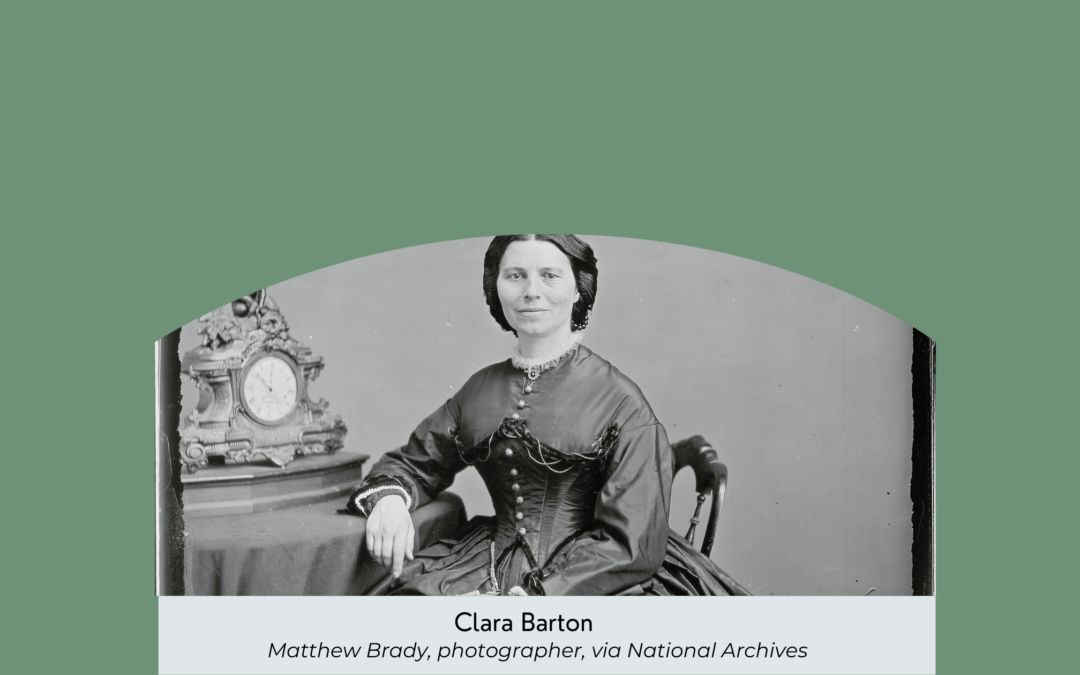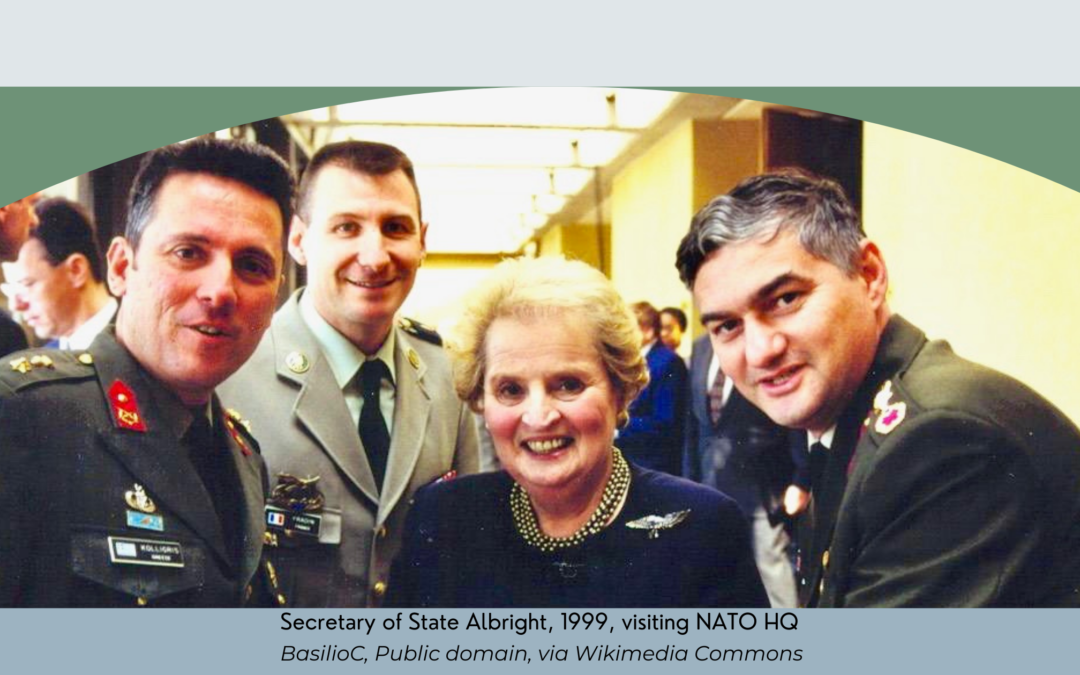
by Kate Evert | Mar 15, 2022 | Inspiration, Leadership, Management, Women's History Month
Can you remember the first time you learned about Clara Barton?
She has recently shown up in a mini-series and most people probably just nodded and thought, “Of course, Clara Barton, founder of the American Red Cross.”
Did you know that she was also a patent office clerk? Seems that being paid the same amount as her male colleagues was quite the problem – and a first for a female government clerk. Yet being in Washington, D.C. at the outbreak of the Civil War put her in the right place at the right time to find her life’s calling.
As we watch images of refugees leaving Ukraine in the latest of the world’s conflicts, someone like Clara Barton springs to mind — someone with an incredible knack for organization, skill at tending to the wounded, and, importantly, raising the funds to do the work.
A recent piece on Marketplace focused on how best to help those fleeing Ukraine mentioned, yes Clara Barton, who handed out cash in 1870 during the Franco-Prussian War.
Wait – she was even helping in the Franco Prussian War?
Take a few minutes to read a bit about her life.
She was painfully shy as a young girl, but when did she feel most comfortable? Helping others.
She got rather good at it.

by Kate Evert | Mar 1, 2022 | Inspiration, Leadership, Sacrifice, Women's History Month
Women’s History Month Kicks off today in the US, UK, and Australia amongst other countries.
Madeleine Albright deserves a place in U.S. History books as the first woman to serve as Secretary of State for the country she immigrated to as a girl. She immigrated to the US after living in the UK and Switzerland after her own country was overtaken at the outset of World War II.
In 2012, she published a book called Prague Winter which recounted her family’s journey from a relatively young democracy, Czechoslovakia, to England, where she and her family were again in harms way thanks to Nazi bombing raids. The book provides a great deal of background detail on the history of the country and the region so that those unfamiliar with it could understand the pre-conditions that gave Hitler the excuses he exploited to annex her homeland in 1938.
When discussing why she wrote the book, and the key lessons people should take from it, she summarized (paraphrased from memory):
Czechoslovakia was the only democracy in the region and over a weekend other countries decided it was worth sacrificing to a madman because it was small and spoke a funny language.
No wonder she was the first woman who came to mind as we start out this month. Long before Madeleine Albright was making history, she had a first-row seat TO history.

by Kate Evert | Feb 8, 2022 | Data, Economy, Future of Work, Human Capital, Inspiration, Labor Markets
… by all of the recent jobs data.
In an attempt to make any sense of all of the swirling data, I listened to a recent podcast by The Economist which showcased a few employers in Buffalo, New York. Some companies there are willing to hire for potential: people that they know can do the work but lack specific skills, so they are willing to train them.
In recent decades, as the Baby Boomers flooded the labor market, the days of investing in employees and training seemed to evaporate. Too few organizations were willing to invest in employee training, and seemed reluctant to hire based on competencies or a person’s distinctive combination of experiences and skills that could contribute to an enterprise.
If there is one thing you think of when you hear Buffalo, it is SNOW. During the podcast, I began to think of Snowflake Bentley, a children’s book, with art so captivating that it won the coveted Caldecott Medal for its illustrations in 1999.
Snowflake Bentley’s parents didn’t treat him the same as every other farm boy; they encouraged his curiosity and invested in his interest to study nature – especially the elusive quest to photograph something that could melt in an instant.
Like snowflakes, no two humans are alike. The labor markets right now are about as fierce as the snowstorms that Snowflake Bentley braved for his research. The companies that will weather this storm are those that understand what core elements are essential to making someone successful at their organization. Then, if they believe in the potential of the people they hire, invest in them and their raw talent, and reward them not only with compensation, but with increasingly interesting assignments, those organizations need not be adrift.

by Kate Evert | Feb 2, 2022 | Covid-19, Future of Work, Human Capital, Inspiration, Pivoting, Productivity, Strategy
Those of us of a certain age, grew up when Groundhog Day only meant one thing: one day in February when kids, especially, waited to see if there was a chance of an early spring.
Since the early 1990s, the phrase has taken on a new meaning, a day that seems to repeat over and over again … without end. In the spirit of that NEW meaning, we are rerunning last year’s February 2 Blog …
If Covid had a mascot, it would be the groundhog, at least in the United States. Various animals in different northern regions have stuck their necks out to foretell if winter is over. Every year on February 2, many cultures look for a sign that winter might end.
Recently, a podcast caught my attention; hadn’t hit start, hadn’t heard of the book, but who wouldn’t keep listening about a book called Wintering when it is January in the snowy North? The author, Katherine May, read a passage:
“Plants and animals don’t fight the winter; they don’t pretend it’s not happening and attempt to carry on living the same lives they lived in the summer. They prepare. They adapt.”
Suddenly you recall an Aesop’s fable, of the Ant and the Grasshopper. One creature is busy storing food for the cold weather, one plays in the sun and does not. You probably first heard this tale at about the age of five, and Aesop wrote, or at least recorded it, 5,000 years ago.
In her interview, the author says she feels that Covid has been one L O N G Wintering. Many of us have forgotten how to winter—how to store away preserves in our cellars for the seasons in which the harvests are not plentiful. Companies either don’t retain earnings for a rainy day or are pressured to pay them out to shareholders.
This February 2, the groundhog represents us emerging from our Covid Hibernation, looking for hope, an efficient vaccine distribution system, some semblance of normal. As we all know we will have at least six more weeks of Covid Winter, but perhaps we can resolve to prepare a bit more for our next “wintering”—whatever it may be—so that we might be more prepared, like the ant, and not have to go underground, like the groundhog.

by Kate Evert | Nov 30, 2021 | Community, Human Capital, Inspiration, Leadership, Management, Sacrifice
Many of us have probably spent the last week or so reflecting on the things that we are thankful for … I wonder how many of us went beyond food, clothing, and shelter to spare a few moments for the mentors in our life?
Some of us have been blessed with amazing mentors. The extremely lucky have been blessed with several outstanding mentors. Recently, a group of fortunate people assembled to celebrate the life of an amazing man who had been an outstanding one to so many – from attorneys to adolescents to apprentice advocates.
Without ever having met the man, I was nevertheless touched by all I heard and reflected upon what his mentorship had meant for so many, including many people I know. Without his generosity, one of my high school classmates wouldn’t have sat in front of me, class after class, and probably wouldn’t be a doctor today. Without his tutelage, many a current judge wouldn’t be on the bench, meting out just justice. Today there are businesspeople, not-for-profit leaders, and educators, who pursue their life’s work influenced by his work ethic, wisdom, and wit. It seems that this gifted, good, and generous man understood the part that luck and a break or two had played in his own life and felt that others were entitled to the same. For so many assembled, they credited his influence that started at a very young age, many times as their after-school job in high school.
We tend to think that a mentor comes later in life, as part of a formal workplace program. Tim Ryan, current US Chair of PwC, often tells a pivotal story in his life, career journey, and management approach – that came from his boss at his high school job in a grocery store. That only reinforces how early these lessons CAN be learned, and perhaps SHOULD be learned.
As this crazy year comes to an end, here’s hoping that you have time to reflect on a mentor or two in your own life. If you haven’t been lucky enough to ever have one, or an amazing one, perhaps resolve to become one for someone else? It might be that break, that chance, that bit of luck, that changes their outlook … or even the outcome of their life.

by Kate Evert | Nov 11, 2021 | Hiring, Human Capital, Inspiration, Jobs, Labor Markets, Leadership, Recruiting, Sacrifice
A friend’s recent LinkedIn post grabbed my attention and resonated with me, both personally and professionally. My friend is among 30 professionals who received recognition as a Military Veteran Executive. He credits his career success to many lessons learned in the Army, citing the fact that few civilian experiences require the same level of teamwork, or mental and physical fortitude.
My father was a member of The Greatest Generation; he served in WWII having enlisted in the Marines right out of high school. In my family, a grandfather, two uncles, and cousins also served our country in various branches of the military. My friend’s LinkedIn post reminded me of the many lessons my father shared with me about how his time in the Marine Corps shaped his life.
These days, the news is constantly filled with stories of the chronic labor shortage. How often do employers think about what an amazing and qualified source of talent our former veterans can be? As HR professionals, we readily see the breadth of competencies and experiences this talent pool offers:
- Leadership and teamwork
- Strong work ethic
- Problem-solving and decision-making
- Honesty, integrity, and attention to detail.
According to the Bureau of Labor Statistics, in 2020, 18.5 million men and women were veterans, accounting for about 7% of the civilian, non-institutionalized population ages 18 and older. Further, the Armed Forces see more than 200,000 U.S. service members return to civilian life each year.
Employers such as JP Morgan Chase, Walgreens, Boeing, and Home Depot all have hiring programs for veterans. While many smaller employers might not have such targeted programs, recruiters can consider resources both locally and regionally that offer programs to help veterans transition from serving our country to civilian work life.
Just few programs are:
- Hiring our Heroes
- Veterans Opportunity to Work (VOW)
- The U.S. Department of Veterans Affairs has training videos for HR professionals on its website.
- The U.S. Chamber of Commerce Hiring Our Heroes job fairs offer in-person training for HR and hiring managers.
- The Society of Human Resource Management’s (SHRM) Foundation has developed the Veterans at Work program to provide HR professionals, people managers and business leaders with proven educational content and resources, at no cost, to learn effective ways to reduce barriers and stigmas affecting the employment of veterans and their families.
- The Foundation also offers a Veterans at Work Certificate Program education program that focuses on best practices to attract, hire, and retain veterans.
This Veteran’s Day let’s go beyond the “Thank you for your service” and find tangible ways to honor their service by creating ways to welcome them into the workplace. I don’t know about you, but I sure think a few more veterans in some logistics jobs might help us with some of our supply chain issues!






